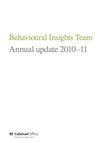Behavioural insights could save millions of pounds
The Government’s Behavioural Insights Team annual report outlines a series of new approaches it has tested over the past year to increase people’s health, encourage them to make their houses more energy efficient or boost tax repayment rates.
The report also includes ideas the team is working on alongside Government departments to reduce public sector fraud and error.
The early successes have led to widespread interest in applying behavioural approaches across Government.
he Behavioural Insights Team was set up by the Government in July 2010 to find innovative and cost-effective ways to change people’s behaviour. It is the first of its kind in the world.
Examples of how behavioural insights have been applied in 2010-11 include:
- Organ donation – a ‘required choice’ for online vehicle licence applicants was introduced from 31 July. It is estimated that this will more than double the proportion joining the register and bring an extra million donors over the course of this Parliament
- Healthier food – salt in pre-prepared food is to be reduced by 15% on 2010 targets as part of a voluntary agreement with industry. It is estimated that this will save around 4,500 lives a year.
- Consumer empowerment – giving consumers access to data held about them by firms, in electronic form. This is likely to revolutionise the relationship between consumers and firms.
- Environment – Energy Performance Certificates have been redesigned. These will help 1.4m households a year from 2012 understand how efficient their home is relative to others, and how they can best act to save money and CO.
- Tax – a self-assessment debt campaign using behavioural insights contributed to increased tax being paid by £350m in the first six weeks of the campaign, much earlier than the comparable period last year. This included changing letters to explain that most people in their local area had already paid their taxes, a trial of which boosted repayment rates by around 15%.
Source: UK Cabinet Office
Further background in The Guardian newspaper




